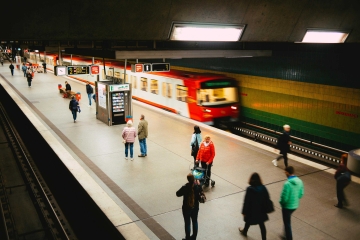Car use in commuter traffic can be significantly reduced by alternatives in digital package

Interest in Mobility as a Service (MaaS), a mobility concept where consumers use different means of transport via a single subscription, is on the rise among employers. This is according to a new study by the Federal Public Service Mobility and Transport. The implementation of MaaS could significantly reduce car use for commuting.
Interest in Mobility as a Service (MaaS), a mobility concept where consumers use different means of transport via a single subscription, is on the rise among employers. This is according to a new study by the Federal Public Service Mobility and Transport. The implementation of MaaS could significantly reduce car use for commuting.
Interest in Mobility as a Service (MaaS), a mobility concept where consumers use different means of transport via a single subscription, is on the rise among employers. This is according to a new study by the Federal Public Service Mobility and Transport. The implementation of MaaS could significantly reduce car use for commuting.
The study aims to find out to what extent companies are willing to opt for a "MaaS B2B" mobility service. In this context, travel is seen as a form of service, in which user comfort is central and which does not require people to own a means of transport in order to get everywhere. MaaS consists of two elements: an app for employees to organize their displacement and a platform for employers to handle it efficiently.
The results show that there is a great willingness to work on alternatives to commuting by car. No matter how diverse the work situation, common is the desire to reduce the proportion of commuting by private car without passengers. A small majority of the participants therefore react positively to the possible application of a MaaS offer in their organization.
However, there are a number of conditions attached. First, MaaS must fit in with the terms of employment. In certain companies, where the employer's intervention is broader than a public transport subscription, more is possible. Furthermore, there must be sufficient viable alternatives to car use and MaaS must also focus on services, such as breakdown assistance and vehicle refueling or charging.
"More and more people combine different means of transport or choose, depending on what they need at the time," said Georges Gilkinet, Federal Minister of Mobility. "Seeing mobility as a service, without being limited to your own car, offers more flexible and comfortable solutions in daily life. MaaS is also good for our planet and for the climate, through innovative solutions to environmental challenges. I want to make MaaS more accessible to everyone, especially for commuting. By fully supporting the dynamics of this sector in full evolution, I want to contribute to the development of MaaS in Belgium to help build a freer mobility."
Latest insights & stories

A Global Movement: The World Unites in a Pink Pledge for Clean and Sustainable Water
5,000 participants. 32 countries. €30,000 funds raised. And that's just the beginning.
Picture this: One step that sends ripples across the globe, transforming lives and creating waves of change. You might wonder, how can such a simple action for most of us have such a profound impact?

Sustainability and circularity in construction
Join us in transforming the future of construction, creating buildings that not only stand the test of time but also contribute to a healthier planet!

RainTunes: Shower scenarios for the soul
Light, hearing, smell, and touch: Together with experts, we have developed sensuous scenarios that turn showering into an individual experience. Whether you want to prepare for the day ahead or relax after working out. Whether you want to refresh after a day’s work or unwind at the end of the evening: RainTunes surprises with multisensory experiences.*
*Currently available only in Germany and Austria.